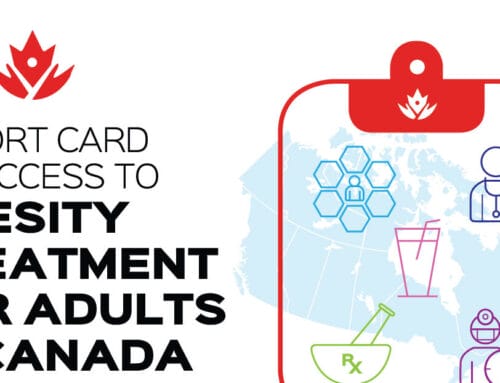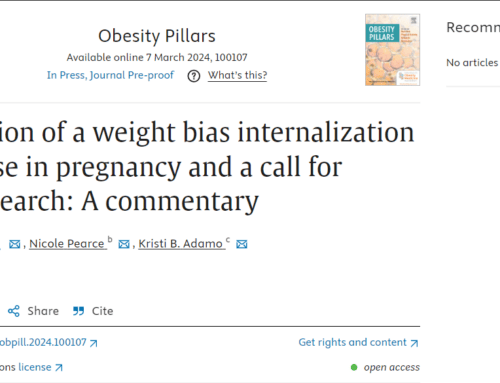Disclaimer: Information provided in this Q&A is for informational purposes only and is not to be construed as medical advice or instruction, medical nutrition therapy or individualized nutrition counselling. The content is not intended to diagnose, treat, cure or prevent any disease and should not be considered a substitute for professional medical expertise or treatment.
Our Ask an Expert series is your opportunity to engage with world-class obesity experts at Obesity Canada. Each month, we will solicit questions for some of Canada’s top researchers and health professionals to answer. This month, it’s Jennifer Brown, a registered dietitian with the Ottawa Hospital Bariatric Centre of Excellence. She received her nutrition degree from St. Francis Xavier University and completed her graduate studies at the University of Ottawa under Dr. Eric Doucet. Her area of interest in research focuses on weight regain after bariatric surgery, specifically exploring appetite-related measures and peripheral hormone changes after Roux-en-Y gastric bypass surgery. She is involved with a number of obesity-related initiatives across North America, including her involvement as a steering committee member on the 2018-19 Canadian Clinical Practice Guidelines for the Treatment of Adults with Obesity, an expert member of the American and Canadian Dietitian associations, chair of the Ontario Bariatric Network Dietitian Working Group and the provincial lead for the eConsult Champlain LHIN in bariatric nutrition.
Q1: I have struggled with my weight all my life; as a young girl my mother had me on diets as early as 11 or 12 to help manage my weight. I have struggled with food and my eating behaviors, sneaking food and binging for as long as I can remember. In my 40s, with my weight at an all-time high, I underwent a gastric bypass and was quite successful, but now three years out I find my eating behaviors are coming back and so is the weight. What would you suggest are the keys to someone managing a regain and gaining control over poor food behaviors?
Jennifer Brown, RD: If I can give you any reassurance; you are not alone. Many people of all different body weights and sizes experience struggles with eating behaviours; however, we are all unique and require individualized assessment and care. Without knowing more about your medical, social and nutritional background, I would recommend that you and anyone else struggling with food behaviours seek out support from regulated professionals such as registered dietitians, psychologists, psychotherapists (in ON, QC, NB, NS only), social workers and physicians that have specialized training in eating behaviours (specifically regarding disordered eating behaviours) that could help individualize care to your needs.
To answer your question about managing weight regain, I would like to provide you and all readers with some information about why our bodies regain weight after weight loss, how this might be affecting food/eating behaviours and how to have a positive outlook on this information. Let’s start by understanding that there are mechanisms both in-and-out of our control that affect our hunger and ultimately can affect our body weight. Some of the factors that are “out of our control”, include our genetics (what has been passed down from our parents), our biology or physiology (how our bodies function), our metabolism (how our bodies breakdown or use molecules) and our environment, just to name a few. To understand why it can be difficult to keep weight off after losing it, we need to know what’s happening inside our bodies.
It all starts in our brain; our biology is designed to keep us alive, so when we lose weight, the brain and body interpret that weight loss as a bad thing. In fact, there is a centre in our brain (called the hypothalamus) that actually controls how much body fat we should carry and every time we lose weight (specifically, body fat), this centre sets off an “alarm system” to other parts in our body that can increase our hunger and decrease our ability to feel full. Regardless of how we lose weight (diets, exercise, medical or surgical interventions, etc.), the brain wants to find ways of regaining that weight back to our heavier weight (called our “setpoint”). There is still a lot that researchers and clinicians are learning about with this setpoint and how or if different treatment options can change it (i.e. surgery is thought to change the body setpoint in some people).
Which brings us to another part of our brain (called the mesolimbic system). This area of the brain gives us a feeling of pleasure and reward, which certain behaviours, actions and even food can have a greater effect. In the case of food, we eat for many reasons, such as survival, social celebrations, grieving and pleasure (just to name a few reasons). Biologically, our brains are designed to seek out higher calorie, highly palatable (yummy tasting) foods as a mechanism to protect the body from starvation (or dying). That’s why no one really craves broccoli. You’d have to eat ~6.5 cups of broccoli to equal the same energy from a chocolate chip cookie (worth 200 calories), plus the brain typically remembers that the cookie tastes better and made you feel better, than having to eat all that broccoli. Layer on the years of eating for all different reasons (pain, stress, boredom, sadness, happiness, anger, etc), these learned behaviours are reinforced in our brains, resulting in some people to turn to food as a coping mechanism to feel better.
There’s a few more pieces to this area of the brain that controls our weight and appetite, but for the sake of time, we need to realize that despite these mechanisms in our brain/body fighting against us, we do have factors that are “in our control”. How we react or cope with stress, pain, and past experiences; how much sleep and/or quality of sleep we get; our physical movement and the foods we eat and our relationships with eating are all factors that we can focus on. Regardless of our weight, these are all factors that everyBODY should strive for. Researchers and health providers are just starting to know more about this complex system along with all the different treatment and therapeutic options available and coming in the future. Seek out health professionals that have training in this area by visiting here and be sure to read this, this and this for more information about everything discussed above and stay connected with updates from Obesity Canada.
Q2: I have talked to a few dietitians over the years as well as a few “specialists” at the gym. Every time I try to get advice on nutrition and eating I have to show a food log and I always get the same advice about the structure of my food day. I always get in trouble and lectured about breakfast and why I don’t eat it. I have never been a breakfast person, but everyone tells me I MUST eat breakfast if I want to lose weight. I am just not hungry in the morning when I wake up and I always thought it was best to listen to my body and eat when I am hungry, not struggle down something I don’t want when I am not hungry. What are your thoughts on breakfast and If I must eat it, and can you help me understand why beyond the fact that everyone says so?
We often hear about how breakfast is the “most important meal of the day”, so I can see how it can be quit frustrating if you have no hunger or if you’ve skipped breakfast most of your life. According to research on our internal body clock, called circadian rhythm, our metabolism and blood sugar control is better in the morning than later in the day, hence eating earlier in the day may be beneficial (here and here). In fact, skipping breakfast has been found (here, here and here) to increase our risk of type 2 diabetes and has been associated with higher body weights (here and here). However, most studies that say skipping breakfast is bad for our health and weight are using observational or association data, which is not the same as saying skipping breakfast “causes” type 2 diabetes or higher body weight. It’s important to look at studies that measure the cause and effect of skipping breakfast, which these studies (here and here) have found that eating breakfast controls hunger better, reduces cravings and reduces overeating later in the day, however there is still no consensus if skipping breakfast is good or bad (here’s a good review).
Here’s the bottom line: If you currently skip breakfast and notice you have higher cravings, hunger or feel less productive later in the day, especially in the mid-afternoons or evenings, you could benefit from having something to eat earlier. Most people that include a higher protein-based meal (20-35g protein) at breakfast have a decrease in hunger and cravings later in the day. This could be as simple as making an egg/cheese sandwich or wrap with a side of Greek yogurt mixed with fruit, granola and nuts; or making a smoothie with milk (cow, soy or almond milk), protein powder, mixed fruit and some Greek yogurt; or if you’re like me and dislike the typical “breakfast-type” foods (cereals, toast, pancakes, etc), then try having dinner leftovers at breakfast. My favorite is taking leftover chicken or black beans and adding some cheese and salsa to a wrap, heating it up to melt the cheese and enjoying this with a fruit/yogurt smoothie.
In my experience, most of my clients that skip breakfast struggle with feeling really hungry later in the day or have strong cravings at night but after incorporating regular eating habits within 1-2 hours of waking and having more protein and fibre at their first meal (‘breakfast”), they report having more energy during the day, feel less sluggish and don’t have as strong of cravings or hunger during the day. Maybe try having something in the morning and see how you feel compared to what you’re doing now (i.e. are you more or less hungry, do you have more or less cravings, what about your energy level or concentration?).
And if you just hate eating breakfast or aren’t hungry, then listen to your body and don’t worry about what everyone tells you. Just be mindful that you might be eating more foods later in the day to compensate for skipping earlier. Good luck.
Click here to submit questions on behaviour change to one of Canada’s top experts!
Read Issue #2 on Obesity Treatment
The opinions expressed in Ask the Expert are those of the profiled expert, and not necessarily those of Obesity Canada. Content does not constitute medical advice.






